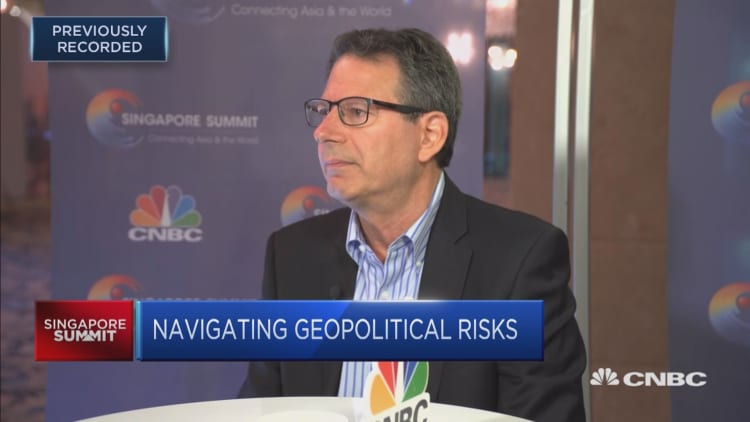
The strategic partnership between China and Russia, long marred by mutual suspicion, has risen to new heights with recent news of joint projects of more than $100 billion and large-scale army drills.
But such cooperation belies the rivalry that defines the relationship between Chinese President Xi Jinping and Russian Prime Minister Vladimir Putin, political strategists warn.
"The Chinese-Russian military alliance is only what you see above the surface," Robert Kaplan, senior fellow at the Center for a New American Security, a think tank focused on U.S. national security issues, told CNBC on the sidelines of the Singapore Summit on Friday.
"What's below the surface is serious geopolitical competition between China and Russia," he said.
Beijing's economic and commercial activities in Moscow's backyard — Central Asia, the Russian Far East and the Arctic — have long been a threat to Putin. But his government has been unable to compete due to its own economic problems at home and in 2014, Moscow accelerated its pivot towards Beijing after coming under western sanctions over its annexation of Crimea.
While Putin and Xi seek to reconcile their differences, as reflected by their public show of drinking vodka and eating caviar together at this week's Eastern Economic Forum, deep-seated rivalry remains.
The bilateral relationship is more of an entente, a basic agreement about the fundamentals of world order supported by common interests, rather than an alliance, Dmitri Trenin, director of the Carnegie Moscow Center, said in a note this week. Moscow's concerns about Xi's Belt and Road Initiative are still at play, Trenin suggested.
Russia is a participant in the massive infrastructure program but the venture could ultimately prove to be negative for Putin.
"What it really does is sideline Russia even more than it sidelines America because it pushes Russia into second-tier status in the Eurasian space," said Kaplan, who's also a senior advisor at consultancy Eurasia Group. "The Chinese are the top dogs" in the bilateral relationship while "the Russians are number two," he continued.
The newly-fortified partnership between Moscow and Beijing is seen as risky for Washington but President Donald Trump's administration doesn't seem to be alarmed. Defense Secretary James Mattis told reporters this week that he saw "little in the long-term that aligns Russia and China."
That argument, however, may be outdated.
Western officials and academics have long been convinced that China-Russia ties don't warrant concern because of underlying tensions over influence in former Soviet Union territories, James Brown, associate professor at Temple University in Tokyo, told CNBC this week.
But because Russia has been forced to put aside those concerns amid its isolation, the West will have to re-assess the China-Russia relationship and recognize that it's transformed into a quasi-alliance, Brown continued.

